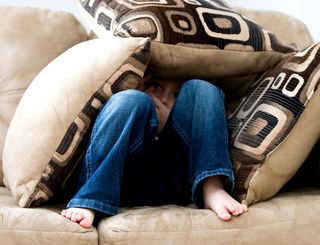Coronavirus Disease 2019
Worrying Isn't the Best Response to the COVID-19 Crisis
There's lots of things we should do to address COVID-19, but worrying isn't one.
Posted March 18, 2020 Reviewed by Gary Drevitch
For many readers out there, I’ll bet the past few weeks have felt bizarre and somewhat chaotic, like something out of a Stephen King novel. Schools, parks, and restaurants closing; grocery store shelves empty; having to keep our distance even from friends and family; and so on. It’s already been a trying time and it feels like it’s only just starting. Believe me, we are right there with you.

Many of us are dealing with problems we’ve never faced before – finding ways to telework from home, figuring out childcare if we do have to work, or paying our bills if we’re unable to work, not to mention those of us searching for options to feed our families if we usually depend on the school for that. And above all, we're trying to stay healthy and prevent the virus from spreading. These are very real challenges we’re facing, which can naturally make us feel very worried.
Anxiety researchers define worry as a sequence of repetitive thoughts and images focused on threatening issues, with uncertain (but possibly negative) outcomes. Worry is also accompanied by negative emotion and feelings of arousal. For many of us, worry is a daily experience even in the best of times, and if you tend to be an anxious person it may feel like your worries have just amplified exponentially.
Michelle and I have spent many years studying worry, and we know how hard it is break the worry habit. While many of us are intuitively aware that worry makes us anxious and upset, research shows that we still tend to lean on worry when facing problems in our lives. One reason for this (which we covered in our prior post), is that we may worry as a way to feel emotionally prepared for negative outcomes. However, another reason – which feels particularly relevant now – is that people often conflate worry with problem solving.
In fact, anxiety researchers have suggested that worry represents an attempt at problem solving over a threatening issue, and people who worry tend to believe that it helps them stay focused, find solutions, and avoid negative outcomes.
But does it really?
We recently ran a study to test this very question. We invited both high and low worriers to come into our lab and describe a current problem they were experiencing in their lives. Then we randomly assigned some of them to worry about their problem, while we asked others to consider their problem in a more objective, neutral way (that is, to break it down into smaller parts, or come up with goals, and to try not to focus on negative outcomes). Afterwards, we asked everyone to come up with solutions to their problem.
Here’s what we found:
People who had worried about their problem generated slightly less effective solutions than did those who had engaged in more objective, less catastrophic thinking. Also, those who worried beforehand still felt worried and anxious even after solving the problem. (So rather than feel a sense of relief, they were still worked up over the issue.) On top of that, the more people had worried about their problem beforehand, the less likely they said they would be to actually carry out their solution.
Why did this happen?
When we worry about a problem, our attention is focused on the threatening aspects of the situation, such as potential negative outcomes. Therefore, worrying may impair our ability to think clearly, because it takes effort to shift our attention away from threats in order to focus on finding solutions (or what’s called “goal-directed attention”, which is essential for problem solving). Furthermore, trying to solve a problem when anxious or upset is likely to make us feel more pessimistic about our efforts, and therefore might make us less likely to actually put our ideas into action.
The bottom line is that although worry can sometimes feel like a productive behavior, it’s not the same as problem solving. For example, let’s say you’re thinking about an upcoming deadline for a work assignment. Worrying about it can lead to thoughts like, “What if I can’t finish on time?”, or “What if my boss tells me she doesn’t like it?” This could even spin into concerns about personal competence at work, and possibly other life domains as well, all of which can make it harder to focus on the assignment. Problem solving, on the other hand, would involve planning good strategies for accomplishing your goal, such as setting aside time in the coming days to work on it, and it usually makes you feel better about the situation.
How does this help us improve our approach to the problem of COVID-19?
First, despite all the anxiety-provoking information you might be getting, both from the news and social media, it’s actually better for you NOT to worry about it. In fact, worrying is likely to reduce your ability to come up with good solutions to the problems you’re facing. And even if you do come up with good ideas, worrying might reduce your willingness to carry them out. And it’s likely going to keep you feeling worried and anxious in the long run.
Therefore, the most helpful thing you can do right now is to stay focused on your goals (i.e., keeping yourself and those around you healthy), and to try to think about the situation objectively. This doesn’t mean acting cavalier about it – you owe it to yourself and those around you to take it seriously. But if you find yourself panicking or catastrophizing, just remember – this isn’t the most effective approach to problem solving, and will just make you feel worse in the long run.
So here’s our advice: remember to wash your hands, practice "social distancing", stay informed using reliable sources (but limit your web searching or news watching on this topic to no more than half an hour per day), and follow appropriate medical advice. And try to begin putting a little “social distance” between yourself and your worries as well.
References
Llera, S. J., & Newman, M. G. (submitted). The effect of worry on problem-solving ability: An experimental study.




